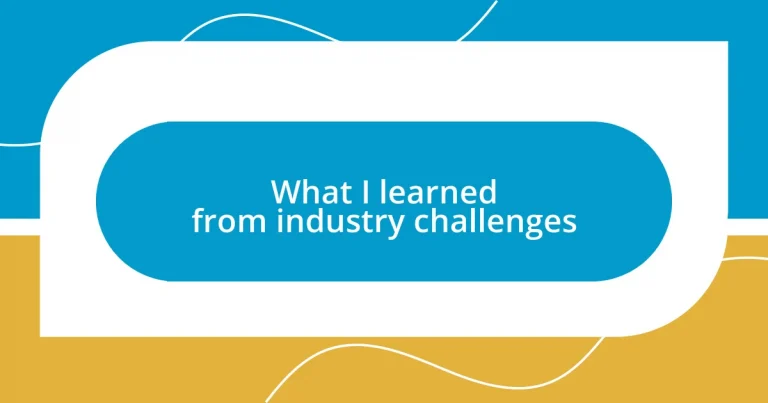Key takeaways:
- Proactive problem-solving and flexibility in adapting to industry challenges lead to greater resilience and innovation.
- Gaining insights from failures fosters empathy and drives better understanding of client needs and market demands.
- Collaboration across teams enhances creativity, transforms conflicts into solutions, and ultimately elevates project outcomes.
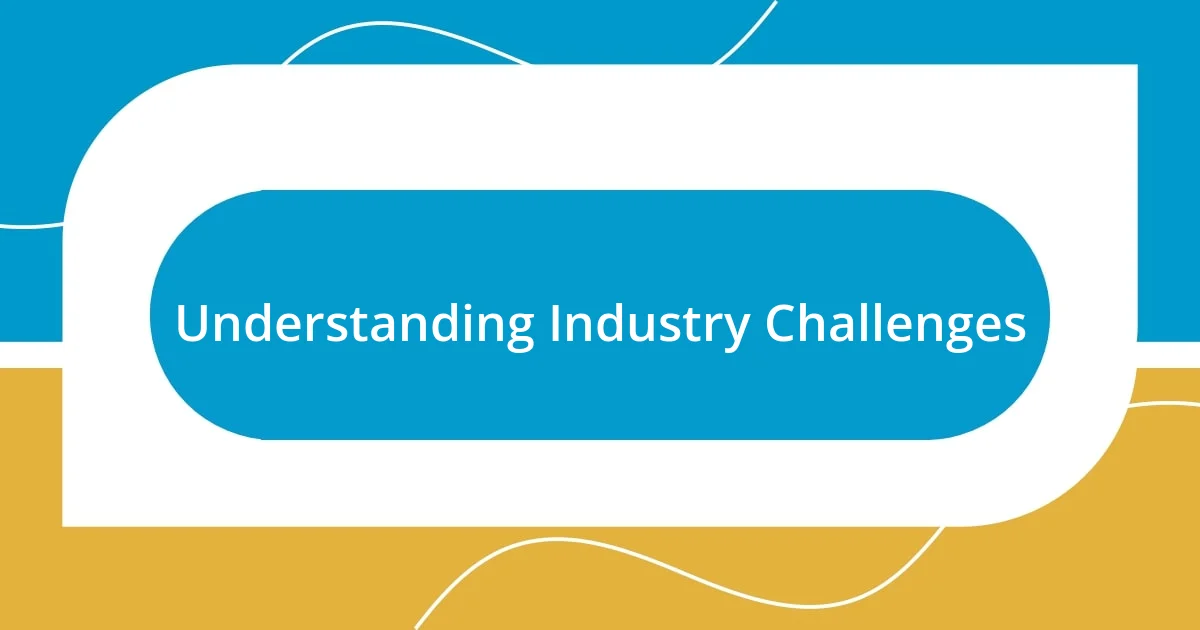
Understanding Industry Challenges
Navigating industry challenges often feels like walking a tightrope, where one misstep can lead to significant setbacks. I recall a time when a sudden market shift left my team scrambling, forcing us to rethink our strategies overnight. How do we adapt when faced with such unpredictability? It’s a question that keeps me awake sometimes, reminding me that flexibility is key in any industry.
One lesson that stands out from my experiences is the importance of proactive problem-solving. I learned that waiting for issues to arise often results in damage control rather than paving the way for innovation. I remember implementing a feedback loop with my team, which transformed how we approached obstacles—less reaction and more anticipation. Have you ever built a system that empowers you to spot problems before they escalate? It’s incredibly rewarding.
Moreover, industry challenges provide a unique opportunity for growth. I often think about the times we’ve changed our operational processes due to client feedback. The discomfort that comes with change can be unsettling, but those moments are where the real learning happens. It’s like navigating a storm; the winds may be fierce, but when the skies clear, you realize you’re wiser and stronger for having weathered it.
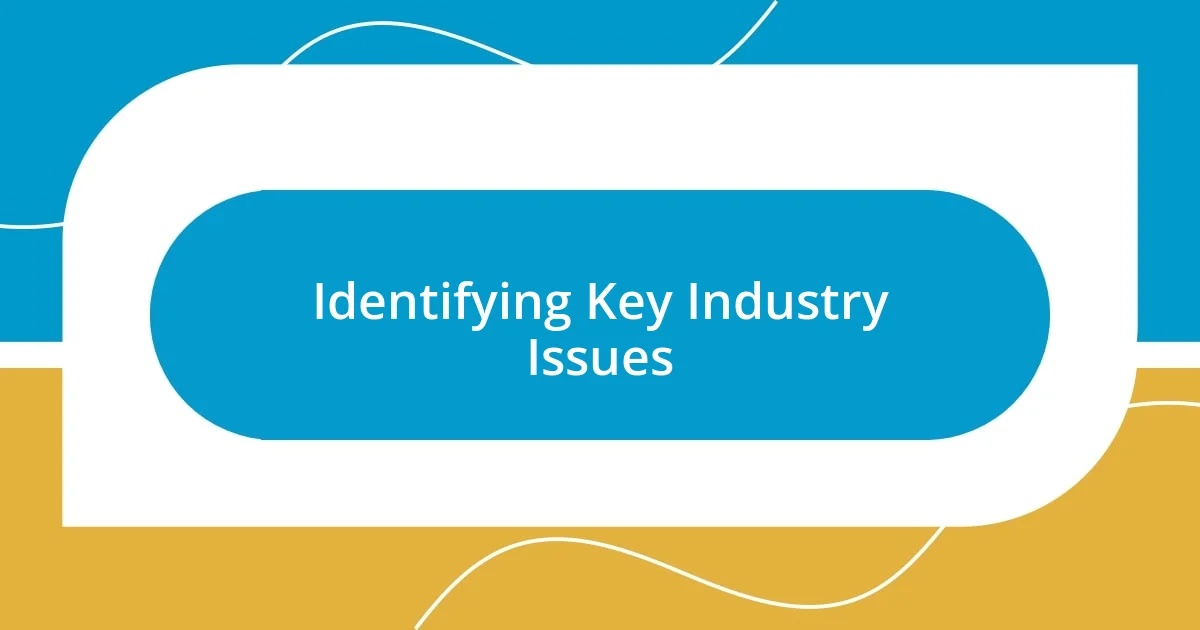
Identifying Key Industry Issues
Identifying key industry issues requires a keen eye and an openness to feedback. In my experience, I’ve often found that recognizing a problem is just the start; it’s the willingness to dive deeper that really counts. For instance, during a project where deadlines were consistently missed, I initiated a series of team discussions. It turned out that communication breakdowns were at the root of our delays. Addressing that single issue led to a dramatic improvement in our workflow.
I also recall a time when we faced mounting customer dissatisfaction. The numbers were alarming, but the real eye-opener was hearing the voices behind the statistics. By conducting customer interviews, we uncovered specific pain points that hadn’t been on our radar. That emotional connection—actually listening to our clients—helped us prioritize our issues in a way that pure data never could.
Ultimately, understanding industry challenges is about more than just identifying problems; it’s about recognizing the stories and emotions behind them. I think about my initial reluctance to confront a major product flaw. Once I took the plunge and opened up the discussion with my team, surprising insights emerged. This wasn’t just an issue to fix; it had implications for our brand’s integrity, which made the emotional stakes much higher.
| Issue | Impact |
|---|---|
| Communication Breakdown | Workflow Delays |
| Cusomter Dissatisfaction | Brand Trust Erosion |
| Product Flaws | Brand Integrity Concerns |
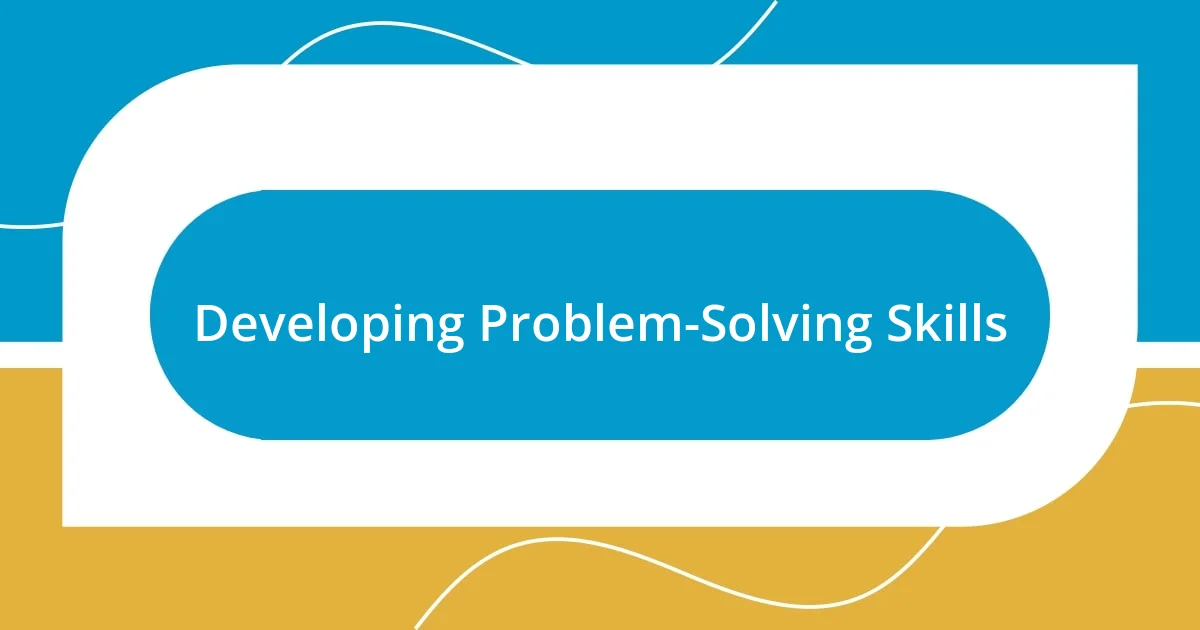
Developing Problem-Solving Skills
Developing problem-solving skills is essential in any industry, as it’s often the key to turning challenges into opportunities. I remember a particularly daunting project where the timeline slipped away from us. Instead of blaming each other, we gathered to dissect the issues. This collaborative approach not only helped us identify the missing links but also built a stronger team dynamic. It’s amazing how facing a problem together can make the solution feel more achievable and less intimidating.
Here are some practical strategies I’ve found useful in enhancing problem-solving skills:
- Encourage Open Communication: Create a safe space for team members to voice concerns and suggestions.
- Embrace Flexibility: Sometimes the original plan doesn’t work. Be willing to pivot and explore new avenues.
- Foster Creativity: Allow time for brainstorming sessions where all ideas are welcome, no matter how unconventional.
- Analyze Past Mistakes: Look at previous challenges from a learning perspective rather than a blame-game, using them as stepping stones for improvement.
- Celebrate Small Wins: Acknowledge and reward the progress made, even during the journey, to motivate continued problem-solving efforts.
Each of these strategies has contributed to my own growth in handling challenges more effectively, creating a proactive mindset that embraces rather than fears obstacles.
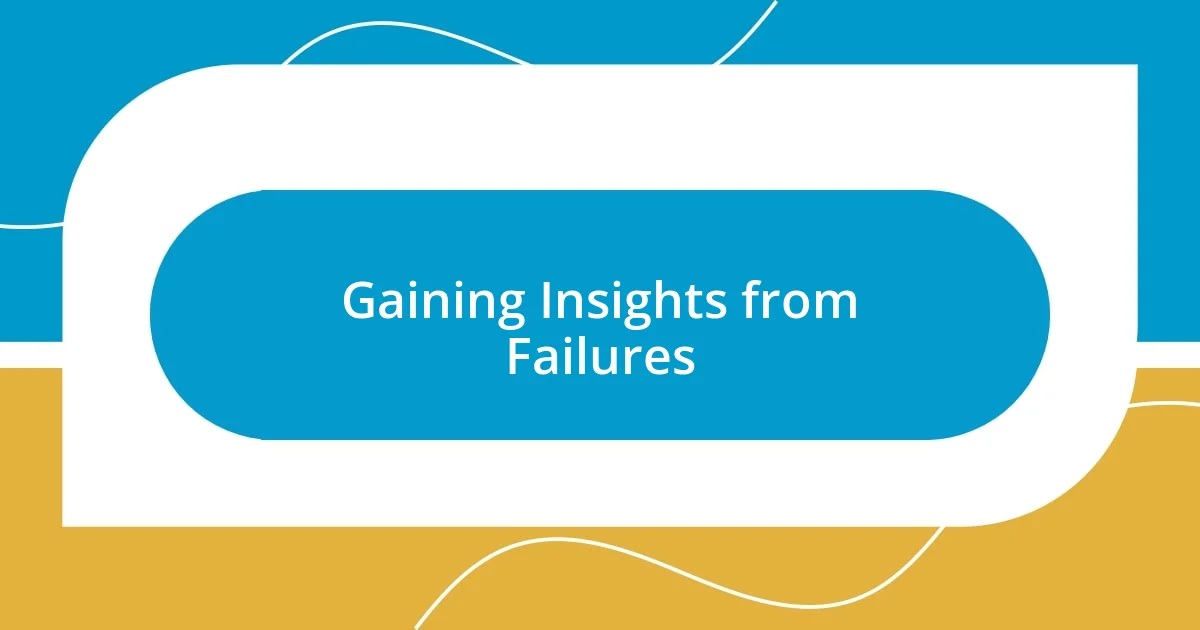
Gaining Insights from Failures
When I think about the times I’ve faced failure, I realize how crucial those moments were in shaping my professional journey. For instance, I vividly remember a launch where we were excited but ultimately missed the mark. It stung, but rather than wallowing in disappointment, I gathered the team to dissect what went wrong. This process of examining our missteps wasn’t just about avoidance; it turned into a treasure trove of insights that we could build upon. Reflecting on our failures helped us identify not just operational flaws, but also the emotional disconnect we had with our audience.
One particularly challenging experience sticks with me: we ran a campaign that flopped dramatically. Initially, I felt embarrassed and angry. However, as we analyzed the feedback, I realized that the failure had illuminated our misjudgments in understanding customer needs. How could we have missed that? Listening to that feedback was painful, but it opened my eyes to the importance of empathy in our strategy. By connecting our failures to the real experiences of our clients, we crafted a more responsive approach moving forward.
Gaining insights from failures often hinges on vulnerability. I’ve learned that sharing these moments—not just within our team but across departments—has led to a culture of openness. I once shared a significant project that went sideways, and instead of judgement, I found support and shared laughter. Isn’t it fascinating how the narrative can shift from failure to learning when we allow ourselves to be human? Each failure became like a stepping stone, guiding us towards innovation and a deeper understanding of our market.
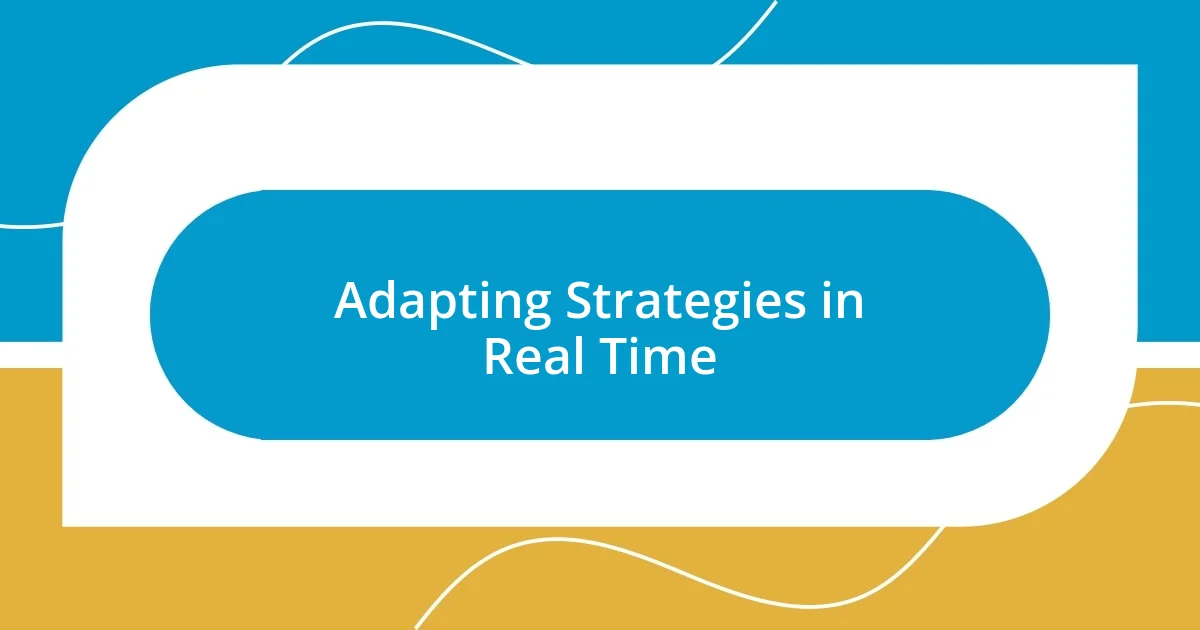
Adapting Strategies in Real Time
Adapting strategies in real time is an exhilarating yet daunting aspect of my work experience. I recall a situation during product development when we faced unexpected regulatory changes that threatened our timeline. Instead of sticking rigidly to our original plan, we huddled together, brainstormed alternatives, and developed a rapid response strategy that ultimately led to an innovative solution. How often do we get caught in the “this is how we always do it” mindset, only to discover that adaptation could open up entirely new avenues for success?
In another instance, we encountered a glaring gap in our customer engagement metrics just weeks before a major rollout. The pressure was on, but rather than panic, we pivoted to gather real-time feedback from our user base. By hosting pop-up focus groups, we quickly adapted our product features based on actual user insights. This entire experience reinforced for me that the best strategies often come from direct dialogue with those we serve. Have you ever considered how powerful it can be to step outside of your structured approach and just ask for input?
Honestly, the most crucial lesson I’ve learned is that adaptation isn’t just a strategy; it’s a mindset. I remember feeling overwhelmed by the chaos of a product launch that was derailed by supply chain issues. Instead of succumbing to stress, I embraced this unpredictability, rallying the team to think creatively about our next steps. Allowing ourselves the flexibility to experiment—and even fail—was liberating. Has there ever been a time when you embraced change and, in doing so, discovered something remarkable? That’s the true power of adapting in real time.
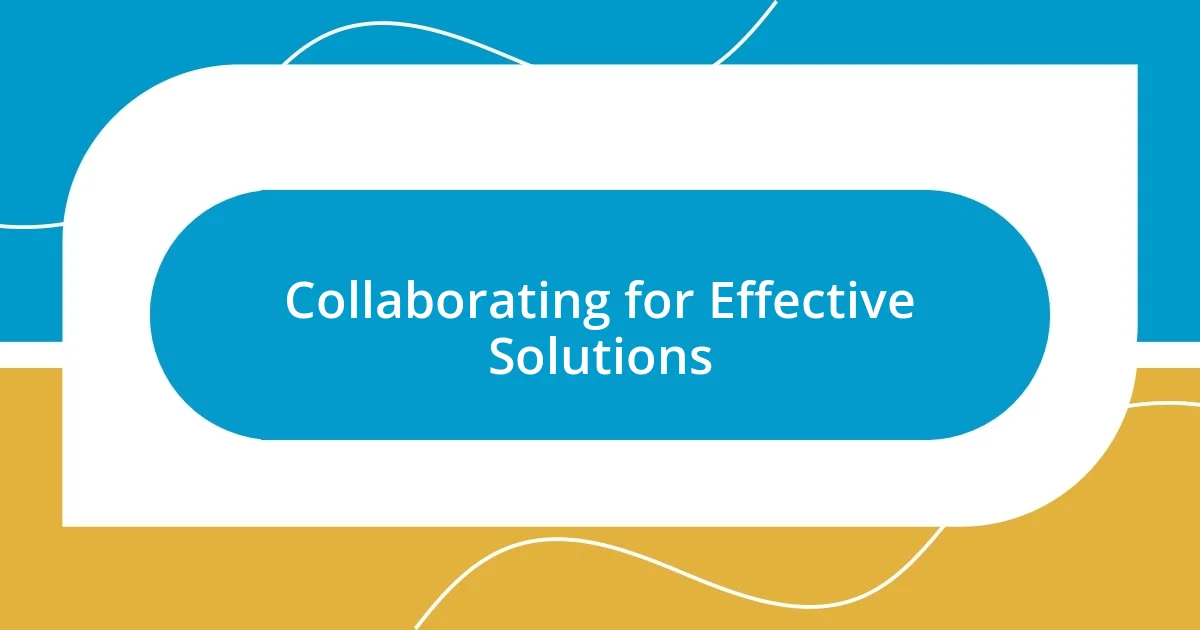
Collaborating for Effective Solutions
Collaboration can be a game-changer when tackling industry challenges. I clearly remember a time when our team faced a significant obstacle related to product design. The energy in the room was thick with uncertainty, but pulling together different departments allowed us to weave diverse perspectives into our solution. One evening, as we brainstormed, someone suggested a radical idea that at first seemed “out there,” but it sparked a conversation that led us to something completely innovative. Have you ever noticed how the best ideas often emerge from the most unexpected discussions?
I get a rush thinking about how collaboration fosters innovation. Once, during a particularly tight deadline, team members from marketing and design joined forces for a last-minute push on a campaign. What surprised me most was how their combined insights not only lightened our workload but also enriched the project with fresh creativity. Every voice mattered in that room, and the outcome? It was a stunning success we were all proud of. When have you realized that teamwork could elevate your work to new heights?
On a more personal note, I’ve learned that collaboration isn’t just about sharing tasks; it’s about building relationships. During one challenging project, I found myself in a heated debate with a colleague over the direction we should take. Instead of digging in my heels, I chose to draw on our shared goal. When we broke down our differing views, we ultimately turned tension into synergy, leading to a solution that neither of us could have crafted alone. Isn’t it amazing how embracing collaboration can transform disagreements into opportunities for growth?
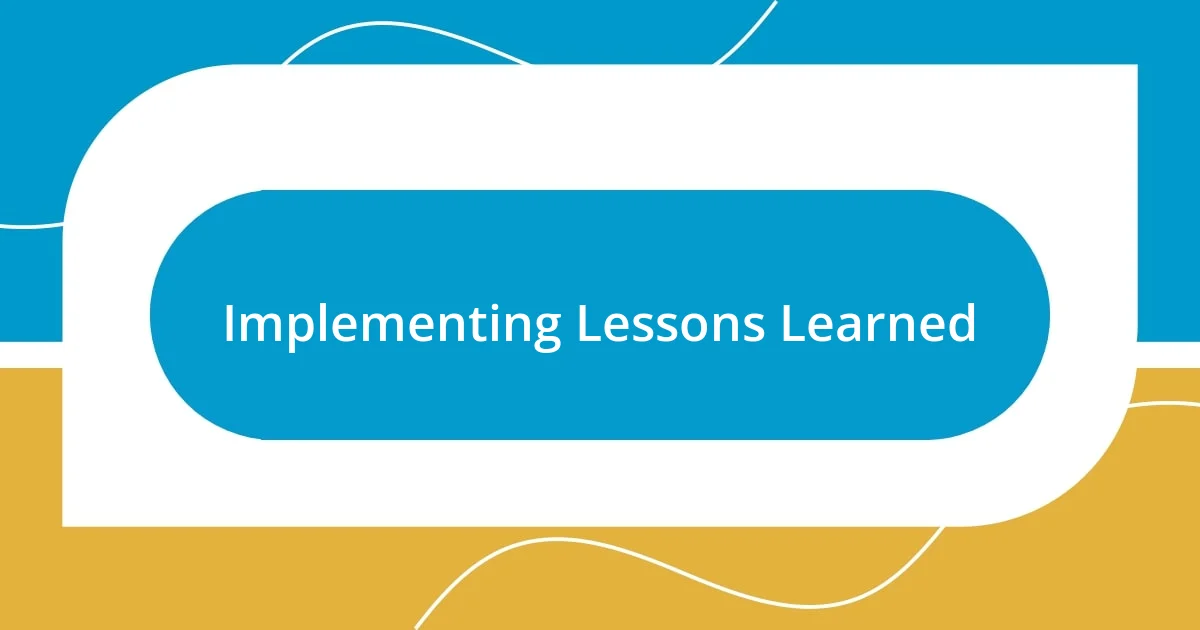
Implementing Lessons Learned
Implementing the lessons I’ve learned from industry challenges has been an ongoing journey that constantly shapes my professional growth. After facing a major setback during a product launch, our team organized a debriefing session where we all shared our perspectives. I realized how vital these conversations are; they help us unearth not only what went wrong but also what could have been done better. Have you ever considered how a simple reflection can turn a failure into a stepping stone?
One of my most revealing experiences came after we missed a crucial deadline due to miscommunication. Instead of moving on to the next task, we took a step back and created an internal knowledge-sharing platform, encouraging everyone to document their learnings. This not only bridged gaps in our workflow but also cultivated an environment of shared accountability. Have you thought about how documenting lessons can foster a deeper understanding within your team?
I find that embodying a mindset of continuous improvement is essential for true growth. In a project where we faced significant design flaws, our team leaned into a friendly post-mortem discussion, which revealed underlying issues we hadn’t addressed. This experience emphasized for me the importance of vulnerability in the workplace; admitting our missteps allowed us to make more informed decisions moving forward. Isn’t it remarkable how acknowledging our challenges can empower us to chart a more successful path ahead?












